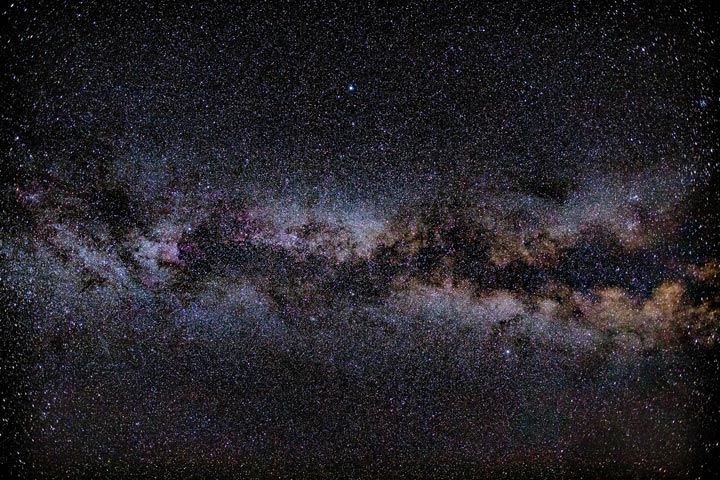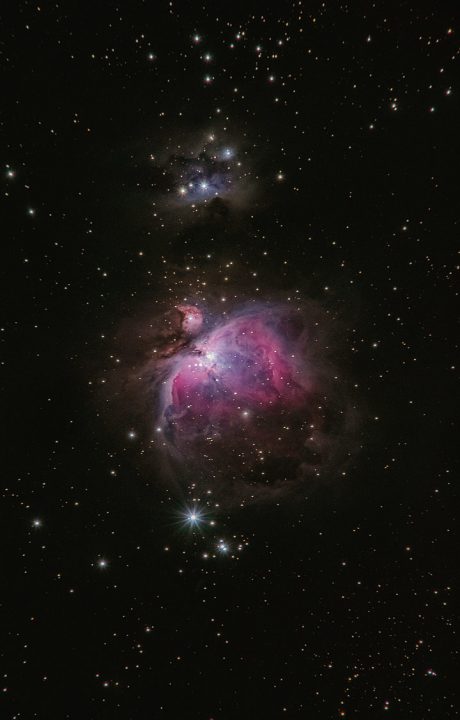The views expressed in our content reflect individual perspectives and do not represent the authoritative views of the Baha'i Faith.
“If we all looked up at the sky more,” my professor told us at the first meeting of our budding astronomy club, “there wouldn’t be wars.”
As a child, I spent hours out on the balcony looking up at the sky. While I sometimes wished I had a telescope, lacking one didn’t dissuade me — I was content watching the glimmering stars or the occasional moving light of a plane or satellite. Now that I’m in my last year of college, I’m the president of a relatively new astronomy club. I’m learning from both experts and peers about telescopes, astrophotography, and the incredible science that we’re using to explore space. But at the end of the day, I’m still mainly attracted to stargazing: lying in the grass somewhere dark, looking up at the sky, and seeing what I can find.
It’s a feeling like no other. In those moments, in the strange intimacy created between me and the universe, when I look up and feel like the smallest creature in existence, I think about what my professor said about the sky and wars. It struck me as surprisingly spiritual in the midst of a science-focused campus. What is it about looking up that can inspire peace in a world full of conflict and conflicted people?
Space, of course, dominates our life in a million different ways: It defines our circadian rhythm, our weather, our seasons, the way we measure time. It has marked the end of some species and changed the chemical composition of Earth. But while the material effects are unavoidable, the Baha’i Writings have taught me that that influence goes beyond just the material: “This limitless universe is like the human body, all the members of which are connected and linked with one another with the greatest strength… The parts of this infinite universe have their members and elements connected with one another, and influence one another spiritually and materially.”
Looking up at the sky affects how we see ourselves and one another. It has an effect on our souls. Baha’u’llah, the founder and prophet of the Baha’i Faith, wrote: “Witness the wondrous evidences of God’s handiwork, and reflect upon its range and character.” Anyone who has looked up on a quiet night and seen a shooting star knows the thrill of that moment of sudden recognition before the beauty of our infinite, mysterious universe. It seems to be ingrained in human nature.

We’ve always looked at the stars and planets and created stories out of them — stories that make us feel warm inside and also feed that yearning to learn more. Visiting a planetarium near my home town in Paraguay some years ago, I learned about how the Guarani tribe in precolonial times saw that range and character, too. They ascribed all sorts of beautiful names to the same constellations we look at today: What we now call the Pleiades was to them a beehive, and the Southern Cross was the footprint of an ostrich. My favorite of all is the Milky Way — “the Tapir’s Path,” as it looks exactly like the kind of messy trail a Tapir would leave making its way through a field.

I wouldn’t want to be an astronaut, but I inevitably cry with happiness and excitement whenever I watch a rocket take to space. If I look at the moon through a telescope, I always linger — even though I’ve seen the moon pretty consistently my whole life. And of course, I’m intrigued about the possibility of aliens (as well as the Baha’i Writings on the topic).
But ultimately, when I’m lying on my back on a blanket on a cool, dark night, I’m not thinking about any of that. I’m simply thinking about all those stars and planets up there, and how incredibly far they are — how unimaginably old. I wonder at the vast contradiction between my own impression of myself and my place in the world, and the fleeting reality of my body in relation to the universe.
On an instinctual level, being mindful of the universe that surrounds the Earth makes us mindful of our own souls. It reminds us of who we really are beyond our physical bodies. As Baha’u’llah described it, “exalted above all egress and regress. [The soul] is still, and yet it soareth; it moveth, and yet it is still. It is, in itself, a testimony that beareth witness to the existence of a world that is contingent, as well as to the reality of a world that hath neither beginning nor end.”

Maybe our attraction to space comes from the fact that the night sky is the closest image we have of infinity — of timelessness. Yet simultaneously, it reminds us of how fleeting our physical existence really is. It’s the closest we can get to visualizing our spiritual reality as infinite souls in temporary bodies, destined for an eternal journey of discovery throughout the many worlds of God — spiritual or otherwise.
There are few things this mysterious that don’t fill us with terror. Humans are afraid of so much, particularly of the unknown. We fear death, darkness, and depth — all things we can’t fully see or grasp — but no one is afraid of looking at the stars. And maybe that’s why we find such comfort in it. Like our divine reality, we’ll never truly know or understand it completely. But the act of discovering even the smallest thing, like learning the name of a new star or seeing light shoot across the sky, is enough to fill our hearts with joy and love for the universe around us.
















Comments
Sign in or create an account
Continue with Googleor